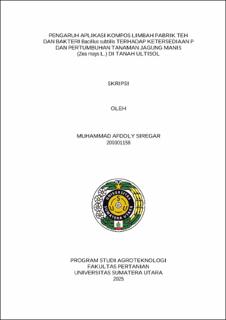Pengaruh Aplikasi Kompos Limbah Pabrik Teh dan Bakteri Bacillus subtilis terhadap Ketersediaan P dan Pertumbuhan Tanaman Jagung Manis (Zea mays L.) di Tanah Ultisol
The Effect of Application of Tea Waste Compost and Bacillus subtilis Bacteria on the Availability of Phosphorus and Growth of Sweet Corn Plants (Zea Mays L.) in Ultisol Soil

Date
2025Author
Siregar, Muhammad Afdoly
Advisor(s)
Sembiring, Mariani Br
Metadata
Show full item recordAbstract
This study aims to determine the effect of applying tea waste compost and Bacillus subtilis bacteria, as well as the interaction between tea waste compost and Bacillus subtilis bacteria, on the growth of sweet corn plants (Zea mays L.) in Ultisol soil. The research was conducted in the Greenhouse and Soil Biology Laboratory of the Faculty of Agriculture, University of North Sumatra, from May 2024 until completion. The study used a Randomized Block Design (RBD) with 2 treatment factors and 2 replications. The first factor was the application of tea waste compost with 4 levels: no compost application (K0), 25 g/polybag (K1), 50 g/polybag (K2) and 75 g/polybag (K3). The second factor was the application of Bacillus subtilis bacteria with 4 levels: no bacteria application (B0), 10 ml/polybag (B1), 20 ml/polybag (B2), and 30 ml/polybag (B3). The parameters observed were pH H2O, available phosphorus in the soil after the vegetative period, plant height (cm), number of leaves (pieces), stem diameter of the plant (mm), dry weight of the plant canopy (g), phosphorus content, and phosphorus uptake. The results showed that the application of tea waste compost significantly increased the pH value in Ultisol soil and the dry weight of the plant canopy, with the best compost treatment being 75 g/polybag (K3). The application of Bacillus subtilis bacteria did not have a significant effect on all parameters. The interaction between tea waste compost and Bacillus subtilis bacteria significantly increased the pH in Ultisol soil and dry weight of the plant canopy, with the best treatment being B2K2.
Collections
- Undergraduate Theses [3567]
